Faith

"I approached the composition as a prayer," jazz pianist and composer Dave Brubeck said of his "To Hope! A Celebration," a contemporary setting for the Roman Catholic Mass, "concentrating upon the phrases, trying to probe beneath the surface, hoping to translate into music the powerful words which have grown through the centuries."
Probing beneath the surface marked all of Brubeck’s music, from the revolutionary 1959 polyrhythmic album "Time Out," to his oratorio, "A Light in the Wilderness," and his setting of Thomas Aquinas’ hymn, "Pange Lingua."
Brubeck died on Wednesday of heart failure, a day before his 92nd birthday.
Brubeck is best known in the secular jazz world for his startling compositions using different time signatures, such as 5/4 time in the classic "Take Five," or the mixture of 9/8 time and the more traditional 4/4 rhythm of "Blue Rondo a la Turk." Both pieces are on the "Time Out" album, the first jazz album to sell 1 million copies and still one of the best-selling.
Religious faith, however, was never far from Brubeck’s creative mind.
Up-and coming-/singer-songwriter Noah Gundersen stopped by the Sojourners office to talk with our Brandon Hook about music, his new album Family, God, and creativity.
The Seattle-based folk artist was recently featured on Spotify’s Emerge app, which pits rising artists against each other based on play frequency, and is currently on a U.S. tour.
Special thanks to Noah for stopping by and being so open with us!

NEW YORK — In the afterglow, I give thanks for Thanksgiving Day.
It might be our most spiritual holiday, dealing as it does with that most spiritual of experiences: feeling gratitude.
Despite the commercial drumbeat for the aptly named "Black Friday," Thanksgiving Day itself tends to be about family, food, and free time. On Facebook, people shared recipes for stuffing, answered questions posed by nervous first-time cooks, told stories about traveling to be with family, and flooded the web with photos of people just being together.
I realize that those are ambiguous realities. Not everyone is blessed with healthy families, not everyone has enough food. Many work hard to prepare food and cheer for others to enjoy. But the promise is there — and unlike the promise of material hyperabundance that has come to dominate Christmas, the promise of Thanksgiving Day seems worth pursuing and attainable.
BORN IN MEXICO, Francisco X. Stork moved to Texas with his parents when he was 9. After college he studied Latin American literature at Harvard. Stork then decided to get a law degree, planning to make a living as a lawyer while writing fiction on the side. Many years later, he published the first of his five novels, The Way of the Jaguar. He continues to balance his vocation as a novelist for young adults with a "day job" as a lawyer for a Massachusetts state agency that helps develop affordable housing. Former Sojourners editorial assistant Betsy Shirley, now a student at Yale Divinity School, interviewed Stork last spring at Calvin College's Festival of Faith and Writing.
Betsy Shirley: On your blog you say that every author has a bone to which they return again and again to gnaw. What do you gnaw on?
Francisco X. Stork: The question that characters in my books keep asking themselves is, "Why am I here?" I keep coming back to trying to find some kind of meaning to life and to suffering that keeps people going. All my books center on young people who are questioning themselves in that vein. My first book had a person on death row, the second had a young man with someone out to kill him, and the third one had a boy, Marcelo, who was questioning how he could possibly live in a world of suffering. Those questions of mortality make you a little bit more aware of the preciousness of life.
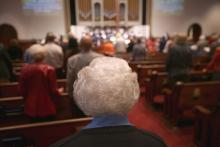
I empathize with people fleeing the local church. Churches can be battlefields instead of harbors, pits of condemnation or politics rather than wells of living water.
But the endless search for something “new” has trumped the life-changing story the body of Christ has nurtured and passed on for 2,000 years. This transforming story is the story the churches enacted weekly in Word and Sacrament before they forgot their original vocation as shelters of truth, life, and light amidst lies, death, and darkness. There were four revealed ways Jesus was present at the center of their public gatherings. These ways have been lost in too many places but are waiting to be rediscovered. More on that in a moment.
A young woman, a house church attendee, told me she longs for solid pastoral guidance, a message prepared weekly by an authoritative teacher, for worship that places Jesus Christ at the exact center of a public space where everyone is welcome, a place where she can bring her disbelieving friends whose lives are not yet transformed by self-sacrificial Love, a place where they can speak openly and honestly about where their lives still remain isolated from a holy God, a place of worship that does not lean on any one person's (or her personal) understanding and articulation of the Gospel but on the collective wisdom of the body of Christ.

I’ve wrestled for years with a Christian faith that focuses on personal salvation, on many levels, some of which I’m still excavating. First, the emphasis on individual salvation always seemed ironically selfish for a faith that seemed otherwise to be about putting yourself second to others. I also struggled with the idea that Christianity is about getting a certain set of beliefs right, articulating them before a group of peers through a statement of faith and then you were official. Is it really so rote? So didactic? So … human?
All my life, I’ve heard stories of people who felt utterly transformed by their faith proclamation, or at the moment of baptism, in the throngs of prayer or during some particularly stirring worship service. They spoke of these feelings for which I longed. I wanted the mountaintop experience, after which I would never be the same. I wanted to be turned inside-out by God, illuminated by the Holy Spirit with a fire that never subsided. I wanted to feel what all these other Christians claimed to be feeling.
I’ve been to literally thousands of worship services in my life. I’ve been back and forth through the Bible, taken communion more than a thousand times, was baptized, sang the songs, said the prayers, and yes, I’ve had moments when I felt as if God was so close I could nearly reach out and touch whatever it was that I sensed.
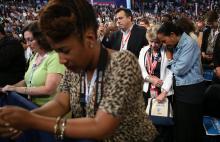
The day after the election, Southern Baptist Seminary President Albert Mohler said, “I think this was an evangelical disaster.”
Not really. But it was a disaster for the religious right, which had again tied its faith to the partisan political agenda of the Republican Party — which did lose the election. But Nov. 6 was an even deeper disaster for the religious right’s leaders, because they will no longer be able to control or easily co-opt the meaning of the term “evangelical.”
During this election, much of the media continued to use the word as a political term — as a key constituency of the Republican conservative base. But what the media really means when they use term “evangelical” is “conservative white evangelical.” All other kinds of evangelicals are just never counted.
Just as the 2012 electoral results finally revealed the demographic transformation of America — which has been occurring for quite some time — it also dramatically demonstrated how the meaning of the word “evangelical” is being transformed.
Evangelical can no longer be accurately used to mean “white evangelical.”

I’m known for holding an alternative view on salvation than many Christians – even Disciples — maintain, in that I do not adhere to the doctrine that Jesus died for our sins. I know there are lots of scriptures to back this position, and one can also use scripture to justify other explanations for Jesus’ death. As many of us have seen, the Bible can be, and has been, used to justify nearly any position we care to use it to support. As for me, I’ve done years of searching, praying, discussing, and reading, and my conclusion is that it is the love of God as manifest by Jesus that is redemptive, and not Jesus’ blood.
I know some folks will likely stop here, discrediting anything else I have to say because of this perspective, which is unfortunate, but which I also understand. But a family member recently asked me about my take on communion if, in fact, I don’t ascribe to the idea that Jesus was saying “this is my body broken and my blood poured out for the remission of your sins.”
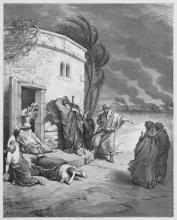
Is God a Cosmic Jerk?
That’s how I ask the question, but professional theologians use the term theodicy. It comes from two Greek words: theo, which means “God,” and dike, which means “justice.” Theodicy asks, “If God is good and just, then why is there so much evil in the world?” There are many answers to this question. Some claim that God causes evil. In which case, my question becomes relevant – Is God a Cosmic Jerk?
Let’s first examine the word “evil.” Theologian Joe Jones succinctly defines evil in his book A Grammar of Christian Faith “as the harm to some creature’s good” (280). Jones distinguishes between two categories of evil that harms a creatures good. First, there is moral evil – the harm humans inflict upon one another through violence, injustice, and oppression. The second category is natural evil – the harm caused by cancer, earthquakes, hurricanes, and other natural events.

I cannot
think that you don't
sound
or breathe
weep
or grieve
I will not
think that you don't
want
or ply
the cosmos
with love
or grace
seeking
us
lost again
I can believe
I can lose you
I can thwart you
I can set you up
I can watch you fall
to die
again
you breathe
weep
cry
sing
and I
am here seeking
better signs

If we try to mold faith into something more certain than simply faith, it becomes something else. A crutch, perhaps, or a drug. So how or when does this happen?
It happens when someone is suffering and we tell them that everything happens for a reason. In the bigger picture, this is that opiate of certainty and assurance being cast over all the chaos, suffering, and doubt in an effort to keep it all tied up neatly in a religious package. But what it creates beneath the surface is a bastardized image of a God who sits in the Great Beyond, plotting out our fortunes and misfortunes, causing loss and heartbreak in our lives for some greater unknown plan. This makes us no more than so much collateral damage in some narcissistic divine game.
Is that really the God we believe in?

Over the past four years I have had the opportunity to spend a significant amount time in the Middle East. I no longer approach the time as a tourist, but instead seek out relationships and experiences as a listener who has much to learn about the way God is at work in contexts much different than my own. In that posture, it has been remarkable how much I have learned and begun to integrate into the way I live, love and lead back in my neighborhood. Theologian Paul Knitter describes it well when he refers to ones inherited worldview as a telescope.
"No matter how objective we may think we are or desire to be, we all see the world through a specific telescope/worldview. When we choose to look through the telescope of people who are “different” than us, we begin to get a more comprehensive picture of the world and the way God is at work within it."
Leading our first Learning Community to the Middle East apart of The Global Immersion Project I recently co-founded, I was invited to take a look through the lens of friends’ telescopes who live amid conflict in Israel and Palestine. Here are some of my key learnings:

SALT LAKE CITY — Mormons in Utah and across the nation were thrilled by the prospect that one of their own might occupy the highest office in the land.
That won’t happen now. But Mitt Romney came closer than any other Latter-day Saint since that once-beleaguered brand of Christianity burst onto the American scene in 1830.
"For many Latter-day Saints, it was a surprise that a Mormon candidate was able to make it as far as Mitt," said Stuart Reid, a Mormon and a Republican state senator from Ogden, Utah. "He’s done more than any single person in recent church history to share with the general public what a Mormon is, putting up a very positive image about Mormons and creating interest in our faith that was unprecedented."
Despite the defeat for Romney, Mormonism came out a winner, said Philip Barlow, chair of Mormon history and culture at Utah State University.
"It developed a thicker skin in the eyes of the world," Barlow said, "and the world could see that a Mormon who runs for office isn’t, by definition, a nut case."
Overall, most observers say, the Romney candidacy was a net positive for his Utah-based faith.

It's a joke. Well, it was. There we were talking with Diana Butler Bass and others from SOGOMedia in an online forum about the Presidential Election and the words flowed forth: Neighborliness is the new sexy. It was ridiculous, but then I started mulling the idea over and this is what happened. Adam Ericksen and I started pondering what Seven Marks of Neighborliness might look like.
1. Be a regular somewhere: Our neighborhoods are actually rather expansive spaces. Some of them involve strip malls. Some of us commute to work and, in that sense, we live in various neighborhoods. Yes, plural. How can we root ourselves in these places? ...

Last Tuesday, after it became clear that Superstorm Sandy was going to bypass Washington, D.C., in favor of New York, I decided to stain the discolored grout in the bathroom.
It appeared that we had a few more hours to stay inside with our batteries and massive food stores—the rains were still torrential, the children were snuggled up under blankets watching a movie, my husband was practicing guitar—so I pulled out the blue painter’s tape and the bottle of Grout Refresh (No. 14: Biscuit/Bizcocho) I’d gotten at Lowe’s and kneeled down on the hard tile.
Painstakingly, and I am not one who usually takes pains—where do you think my son got his ADHD?—I cut strips of tape to edge either side of the lines of grout, a suggestion offered by a commenter on a home improvement forum. Otherwise, my gut would have been to trowel it on, freestyle, and hope for the best.
Once I managed to tape perhaps a three-foot-square section of the floor—I was too eager to invest the time for the whole space—I spread an old Snoopy toothbrush with the thick ecru paste, and dragged it slowly, evenly, down the lines, holding my breath.
I exhaled when I was done, and waited with expectation. Two hours later, after misting my handiwork with water and waiting another interval, I pulled up the strips of tape to see perfectly neat, unstained, biscuit-colored grout, like you might see in a new bathroom, in a new house somewhere.
The results of yesterday’s election appear to show a “dramatic rejection” of the Religious Right, writes Dan Gilgoff on CNN’s Belief Blog.
“For many conservative Christian leaders, it was a nightmare scenario: Barack Obama decisively re-elected. Same-sex marriage adopted by voters in some states. Rigorously anti-abortion candidates defeated in conservative red states. On multiple levels, Tuesday’s election results seemed to mark a dramatic rejection of the Christian right’s agenda.”
Gilgoff also notes that Obama increased his support among white evangelicals in Ohio, and narrowly won Catholics nationwide.

Steve Taylor, film director and rock hero, visits our (mine and Jordan Green's) Homebrewed Christianity podcast to talk about the disappointing theater run of his film, Blue Like Jazz, what made him leave music for film, and to announce his return to music through a new album he’s been working on.
So, yeah, that’s a big deal. And yeah, we’re pretty much breaking the story.
In the Echo Chamber, we talk about the election, Superstorm Sandy, scary movie commercials, and, you know, a bunch of other stuff. Finally, we discuss some common Christian cliches.
Listen ... inside the blog.

Jesus didn’t vote today
Not tomorrow
Not yesterday
Jesus didn’t need the bullet or the ballot box or
The bomb or bayonet or budget
Jesus didn’t vote today
Jesus didn’t authorize drone strikes to kill thousands
Jesus didn’t occupy other countries with standing armies
Jesus was occupied by the Holy Spirit that occupies us even still
Jesus was occupied by the truth of radical love
Jesus was not a feeble, timid, compromised, casual, comfortable, middle-class,
Or otherwise complacent ap
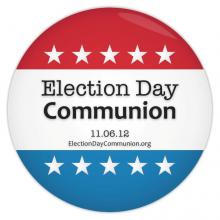
Tuesday, Nov. 6, is Election Day. As we’ve seen these past months, in a closely divided country, elections bring out the worst in us. Hundreds of millions of dollars in negative advertising, families and churches divided, each side convinced that a victory by the other side will be disastrous for the country.
It is clear that Christians will vote in different ways — some for Barack Obama, some for Mitt Romney, some for another candidate, and some will not vote. But Tuesday evening, Christians in more than 800 congregations will be gathering together for communion, regardless of party, political affiliation, or denomination.
The Election Day Communion campaign is the vision of several pastors to build unity in Christ in the midst of theological, political, and denominational differences. In sharing communion together, the Campaign says, Christians can reaffirm our allegiance to Christ and remember some basic truths.
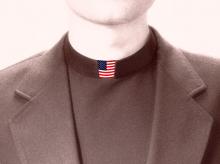
During the 2004 presidential election season, Sojourners put out a bumper sticker with these words: “God Is Not a Republican, or a Democrat.” The number of orders was overwhelming and we kept running out. The simple message struck a chord among many Christians who were tired of the assumptions and claims by the Religious Right that God was indeed a Republican, or at least voted a straight-party ticket for the GOP. They also absurdly implied — and sometimes explicitly stated — that faithful Christians couldn’t support Democratic candidates. We said that voting was always an imperfect choice in a fallen world, based on prudential judgments about how to best vote our values, that people of faith would always vote in different ways — and that was a good thing for a democracy and the common good.
Our efforts appeared to inject some common sense into our nation’s political discourse, but given recent electoral statements and newspaper ads from some conservative Christian leaders, it appears the message bears repeating — God is still not a Republican or Democrat.